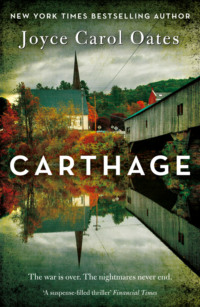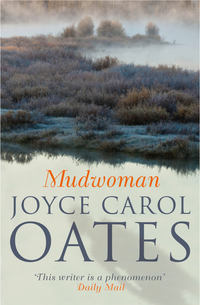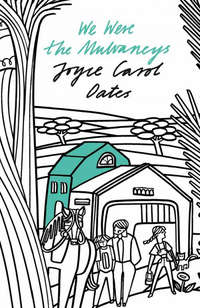
Полная версия
Little Bird of Heaven
4
“HEY SORRY BABE, fuckin’ sorry sweetheart you got in my face.”
And they laughed, that I’d been knocked onto my skinny ass on the basketball court and tears sprang from my widened eyes like cartoon-eyes, not for the first time this afternoon.
And my nose leaking blood from a mean girl’s swift elbow before the referee could blow her ear-shattering whistle.
“Poor baby. Poor li’l white-gal. Man, I am sor-ry!”
After-school basketball at Sparta High. To play with these girls you had to be tall, strong, tough, quick on your feet. Or reckless.
There were other girls I could have played with, if I’d wanted to. Girls my own age, my own size and not so athletic as I was so I’d have been the star player in their midst as I’d been in eighth and ninth grades at the junior high. But I wanted to play with these girls: Billie, Swansea, Kiki, Dolores. They were older, and bigger. They were sixteen, seventeen years old. Dolores may have been eighteen. She and Kiki lived on the Seneca Indian reservation a few miles north of Sparta—they had sleek black straight hair that lashed and swung about their shoulders heads like scimitars, their black eyes shone with malice and merriment. Driving out into the countryside north of the city—the foothills of the Adirondack Mountains—you were made to see the wreckage of long-ago glaciers in their slow violence causing the rocky landscape to contort like something forced through a meat grinder. You were made to see how, being given such untillable and near-uninhabitable land by the U.S. government in treaties they had no choice but to sign generations ago, the descendants of the original Six Tribes of upstate New York might wish to exact some sort of revenge upon their Caucasian benefactors whenever the opportunity arose.
My classmates thought that I was crazy to play with these older girls. I was the youngest, in tenth grade, slender-boned and wily as a snake weaving and darting unpredictably and my silky-blond ponytail flying behind me as if to provoke; more than once as I’d leapt to shoot a basket, I’d felt a sharp little tug on my ponytail to throw me off-stride. I weighed no more than one hundred six pounds and if I was hit—and often, you can be sure, I was hit—by one of the larger girls, I fell to the polished hardwood floor so stunned sometimes I couldn’t get up for several seconds.
“Krista sweetie—you O.K.? C’mon girl, get up.”
Mostly they liked me. Things they said to me—crude, funny, obscene—they said to one another. They were fluent in profanities meant to be endearments—“Out of my face, bitch”—“Fuckin’ white bitch”—“Fuckin’ cunt.” (Most of us were in fact “white”—but there were gradations of “white.” As there were gradations of what was never given a name—“social class”—“background.” At Sparta High there were students, among them Dolores and Kiki, and several other girl-athletes, who had relatives, neighbors, friends, and boyfriends in or recently paroled from juvenile detention facilities and prisons; their obscenity-laced speech was prison-speech, a kind of roughshod poetry.) In their midst I was “Krissie” who didn’t have to be taken seriously, like a team mascot. If I sometimes surprised them by sinking a basket unexpectedly, appropriating a wayward ball, running in my liquid-snaky way beneath their elbows and darting to the front of the court before anyone could stop me, still I was no competition for even the second-best players, I lacked the true athlete’s aggressiveness, the willingness to be mean. When play on the court got rough—as it was sure to do at least once per game—I shrank away, never held on to the ball if I was in danger of being hurt. And if you’d been knocked down and fouled you might then be caressed, if a 150-pound girl collided with you like a dump truck colliding with a baby carriage, knocked you skidding on your skinny little ass on the floor, this same girl might stoop over you to help you to your feet: with a sly slit of a smile she might rub her knuckles against your scalp, or give your ponytail a tug, or pinch the nape of your neck murmuring, “Fuckin’ sorry, baby. You got in my way.”
Not so bad, then. Even a blood-dripping nose.
Limping to the foul line as girls lined up to watch: shooting fouls was what Krissie Diehl became damned good at, having had plenty of opportunities.
“‘Way to go, Krissie! C’mon girl.”
“You go, girl! Show us you’ li’l thang.”
Late-afternoon Thursday, my father appeared at basketball practice. No warning, never any warning for that wasn’t Eddy Diehl’s way.
Lucille would accuse me of making plans with “your father” behind her back but how could I have possibly planned to meet him, my father had made no attempt to contact me in months and I had no way of contacting him except through the Diehls who weren’t very nice to me (as Lucille’s daughter and a co-conspirator they believed); I wasn’t even sure where he was living now—Buffalo? Batavia? Not a day, not an hour passed that I didn’t think of my father and when I wasn’t consciously thinking of him he was a dull throb of an ache in my throat and yet I could not have said with certainty where he might be.
Wake in the night, perspiring and anxious: that throb-ache.
My brother Ben said contemptuously it was like an infection, he had it, too. “Some damn fever. As long as we live here in Sparta and people know our name, we’re sick with it: Eddy Diehl’s kids.”
AFTER BASKETBALL, unless I was staying overnight in town with a classmate, I took the 4:30 P.M. bus home, which was called the “late bus.” (The “regular” bus left at 3:30 P.M.) Our house on the Huron Pike Road was about three miles from Sparta High and I would have been home just after 5 P.M. except: I never got on the bus.
Just inside the gym doors he was standing. Rare to see adults in the gym at such times. As the game ended I limped off the court wiping my sweaty face on my T-shirt and I heard a male voice—startling, in that context—a thrilling growly undertone: “Krista.”
At once I looked up. Looked around. A man not twenty feet away, in a fawn-colored suede jacket, dark trousers, cap pulled low over his forehead. Was he signaling to me?
Now I heard him, more clearly: “Krista. Outside.”
I felt weak. I could not reply. Staring after my father as he pushed through the doors to the corridor beyond, and was gone.
Other girls had seen him, heard him. Of course. They’d sighted him—a man—Krista Diehl’s father?—before I had.
We shuffled into the locker room together. Girls who’d been laughing loudly had quieted. Girls who felt a certain tenderness for me, or, at least, some measure of tolerance, glanced at me with expressions of curiosity, concern.
Diehl? The one who…?
That woman who was killed, he’s the one who…? Why’s he out of prison so soon?
Someone—I think it was our gym teacher—was watching me. Asking me some question but I pretended not to hear. Through the excited buzzing in my ears there was little I might have heard, that I wished to hear.
Wanting to laugh in all their faces. For what did any of them know about my father Eddy Diehl, and me? Thinking He has come for me, you can see how special I am after all.
5
“IT’S OVER.”
Or, “It’s finished.”
These were my mother’s words. There was dignity in my mother’s posture—erect, not visibly tremulous, head held high and eyes unflinching—as there was dignity in the brevity of such a reply: her response to questions put to her about her (ex)-husband Eddy Diehl. For it was not to be avoided, Lucille Bauer was asked about Eddy Diehl, this now muchtalked-of and “controversial” individual to whom she’d been married for eighteen years, which was most of her adult life; and when Lucille wasn’t asked in actual blunt rude pushy words she was asked by implication, indirection.
Oh Lucille! How is it with—? And so she’d taken to replying in this brief cool but perfectly polite way, with a knife-cut of a smile that suggested hurt, or the mockery thereof.
Want to see me cry? Want to see my broken heart? You won’t.
In the 1980s, in Sparta, New York, the expectations of a young woman of Lucille’s class—working-class/middle-class/“respectable”/“good”—were not essentially different from the expectations of Lucille’s mother in the late 1950s and early 1960s: you yearned to be engaged young, married young, start to have your babies young. You yearned to attract the love of an attractive man, possibly even a sexy man, certainly a man who made a good living, a man who was faithful.
In the late 1960s, elsewhere in the country, or, at least, in the tabloid America fantasized, packaged and sold by the commercial media, there had been a sexual revolution: a hippie take-over. But not in Sparta, and not in Herkimer County. Not in upstate New York in this glacier-raddled region in the southern foothills of the Adirondack Mountains. Here, despite a rising divorce rate, more “single-parent” homes (i.e., Negro mothers on welfare, much talked-of, disapproved-of), and other unmistakable incursions of the 1960s fallout, the America of the 1950s yet prevailed, beneath a showy veneer like the faux yellow pine hardwood floors my father’s construction company sold, since prospective homeowners didn’t want to pay for the real thing.
Not publicly but to her family, repeatedly and dazedly my mother would say—not quite within my hearing, but I managed to hear—that she’d never known Eddy: she’d lived with a man for all those years, she’d had two children with him and she’d never known his heart.
(Was this so? Neither Ben nor I had any idea. Photographs of our young parents showed two strikingly attractive individuals: a very pretty round-faced girl with a cheerleader-smile, glamorous teased hair and a sizable bust straining against silk “designer” blouses; a tall broad-shouldered rust-red-haired young man with a jaw like a mallet, wary eyes and a sly half-smile very like the signature smile of the young Elvis Presley. Neither Ben nor I would have wished to acknowledge what seemed obvious if you studied these photos, especially a wedding photo in which the groom’s husky arm is slung about the bride’s shoulders all but crushing her against him, the groom’s large male hand cupped about the bride’s bare upper arm beneath a white lace stole, and the thumb of that hand unobtrusively pressing against, very likely rubbing against, the sweet fatty talcumed flesh of the bride’s right breast. Sex! Our parents! That was it.)
Over those eighteen years, Lucille had gained weight. And then, during the eighteen months preceding her divorce, Lucille had lost weight. Her moon-shaped face that had been such a pretty girl’s face well into her thirties became ravaged, cruelly lined; she’d lost weight too quickly for her skin to shrink, there were loose pockets and pouches of skin everywhere on her body she took pains to keep hidden. But Lucille had the sort of features that took well to make-up, still she could exude an aura of smalltown glamour. She never left the house without dressing presentably: “primping.” She never left the house without fresh-applied lipstick. Not long after the divorce—in September 1984, on the very Tuesday public schools began classes—Lucille had her hair cut and restyled and “lightened” and overnight those single steely hairs like nails had vanished, to her adolescent daughter’s immense relief.
Naively Ben said: “Mom looks different today, you notice?”
“Maybe she was smiling.”
“Ha-ha,” Ben said, in a way meant to convey heavy sarcasm. In all things having to do with my mother Ben flared up quickly, he hated our father for how our father had hurt our mother, thus had to love our mother blindly, without judgment and without nuance. If I persisted in criticizing Lucille, Ben had been known to punch me.
Not that Lucille smiled, much. Not at home.
Away from home, yes Lucille smiled. Returning to church—the First Presbyterian Church of Sparta, a grim triangle-shaped limestone structure that made my heart clutch like a fist, in adolescent resistance each time I was dragged into it—and to her “old, best friends” she’d “all but lost” while married to Eddy Diehl who “hadn’t any patience with nice people.”
Boring people, Mom meant. Nice boring kind-Christian women whose boring husbands hadn’t left them, not yet. Or anyway so far as anyone knew. Yet.
“Krista, Hilda Smith’s daughter Pearl—you must know her, she’s in your class at school?—belongs to Sparta Christian Youth Alliance—they have the most wonderful summer campground at Lake George, Hilda was telling me. I told her I’d speak to you…”
O.K., Mom. You’ve spoken to me.
“We need to put this behind us, Krista. This ugliness. Like an earthquake, or a flood, you’re in shock but then, you know, you galvanize. You come alive. The idea of the Gospels is—‘Good news is possible.’”
Lucille spoke with a hard gritty optimism like one grinding away with her teeth at something lodged in her mouth—some careless takingin of a substance not quite edible, grindable. But she would grind it down, she would swallow it. If you weren’t careful she would make you swallow it, too.
The Herkimer County order of restraint against Edward Diehl had originally been issued in April 1984 and since that time reissued at least once. By this order Edward Diehl was forbidden to approach his (ex)-wife Lucille and his children Benjamin and Krista in any public or private place; he was forbidden to come closer than one hundred feet of any of them; he was forbidden to “trespass” on the Huron Pike Road property that he himself had purchased with a thirty-year mortgage, twelve years before. Of course he dared not approach the house, nor even make telephone calls to the house, which he’d partly remodeled and in which he’d executed so much carpentry over a period of years. (In an extravagant and reckless gesture my father had simply deeded the property over to my mother—“The least he could do,” my mother said bitterly.)
In the months following the divorce, so far as we knew, Daddy lived in Sparta with friends, or relatives; Daddy may even have been taken in by a woman friend; for there were many who knew Eddy Diehl well, who’d gone to high school with him, and been drinking-friends of his, scarcely known to Lucille or to us. These people—mostly men but not exclusively men—were convinced that Eddy Diehl hadn’t done what it was claimed by others that he had done, committed an act of murder: “homicide.” They would not cease to believe in Eddy Diehl’s innocence even after he’d been taken into Sparta police custody, even when it was leaked to the media that he’d “failed” a polygraph test; even when his picture began to appear in local papers and on local TV news in the company of the other “prime suspect” in the case, the father of a classmate of a Sparta man uncannily resembling Eddy Diehl in age, height, physical type.
SUSPECTS IN KRULLER HOMICIDE QUESTIONED BY POLICE
THOUGH MY MOTHER HAD had our telephone number changed, and removed from the directory, yet my father managed to acquire the number as if by magic, and called us. Sometimes when one of us answered he didn’t speak: you listened and heard only a crackling sort of silence, like flames about to erupt. Timidly I said, “Daddy? Is that—you?” but Daddy would not answer, nor would Daddy hang up the phone; at such times I did not know what to do, for I loved my father very much, and was frightened of him; I had been made to be frightened of him; among the Bauers it was whispered that he was a brute, a murderer. And there were many in Sparta who believed yes, my father was a brute, a murderer. If Ben answered his voice went shrill, he was furious, half-sobbing: “We don’t want you to call us, Dad,” but Ben’s voice weakened when he uttered Dad, though he’d steeled himself not to say Dad, yet Dad had come out. Once when I picked up the phone expecting to hear my friend Nancy’s voice instead the voice was a man’s, low and gravelly: “Krista? Just this, honey: I love you.” On trembling legs I stood in the kitchen dazed and blinking as the voice continued, “Is your mother nearby? Is she listening?” and I could not manage to answer, my throat had closed tight, “Don’t hang up yet, honey. Just want you to know I love—” but the look in my face was a signal to my mother, with an angry little cry Mom took the receiver from me and slammed it down without a word.
So that the phone could not ring again, Mom removed the receiver from the hook.
“How dare he! He’s been warned! I should call the police…”
We could not sit down to our dinner! We were too excited to eat.
My mother insisted, we must eat. We must not be upset by him, he must not have such power over us. Numbly we sat at the table, we passed platters of the food that my mother and I had prepared together, we tried not to see where my father stood brooding and smoking in a corner of the kitchen.
My mouth was too dry, I could not chew or swallow. “Maybe he just wants to…” Numbly I spoke, my words were barely audible.
In her cool calm voice my mother said, “No, Krista. It’s over.”
And there were the times, how many times we had no idea, when my father drove past the house; when my father cruised slowly past the house, pausing at the end of the driveway; when my father dared to park at the side of the road, in a stand of straggly trees, not visible from the house. Word sometimes came back to us, from relatives. One of my mother’s cousins called. Virtually all of the Diehls supported Edward, their Eddy; the Bauers were less sure. (There was a split among the Bauers, in fact. Those who believed that Lucille’s husband might have been unfaithful to her, but not that he’d killed that woman: not Eddy! And those who believed yes, Eddy Diehl was capable of murder, if he’d been drunk enough. And angry, and jealous enough.) I knew that my father was close by because, some nights, I could feel his presence. I could hear his voice Krista? Krissie? Where’s my Puss? I’m coming to get my little Krissie-puss. There was a sensation inside my head like fire about to erupt, crystal glass about to be shattered. Almost unbearable excitement like the terrible thrill of a vehicle made to speed too fast for the road, the spinning basketball aimed at your unprotected face: that instant before the ball hits, and your nose spurts blood.
When I was thirteen, that Christmas when there’d been so much snowfall we were snowed in, and Herkimer County snowplows and tow trucks were on the Huron Pike Road through the night, that Christmas morning there was a vehicle parked at the end of the drive—just barely visible from my bedroom window—a pickup truck, it seemed to be—I saw a male figure climb out, and I saw this figure shoveling the end of our driveway where the snowplows had heaped up ridges of icy snow—at first I thought it must be someone from the county, though this wasn’t part of the usual snowplowing service—then I realized it had to be my father, coming to shovel out the end of the driveway as he’d always done after a heavy snowfall, when he’d lived with us.
And where was my father living then? Not in Sparta, I think—he must have made the drive early Christmas morning, in treacherous weather conditions, for this purpose.
Neither my mother nor Ben ever knew, I never told them. That the end of the driveway wasn’t blocked as usual must have made no distinct impression on my mother, when she drove her car out.
Another time, a more careless/desperate time he’d parked at the end of the driveway, very likely he’d been drinking and so forgot to switch off his headlights and Ben happened to notice from an upstairs window and shouted to my mother: “It’s him, Mom! Damn bastard, I hate him!”
In a panic my mother called the number the Herkimer County sheriff had given her for such emergencies and within minutes a squad car careened along Huron Pike Road with a flashing red light like on TV—unresisting, Eddy Diehl was arrested, taken away in handcuffs and in the morning his car was towed away.
Why Lucille declined to press charges, she would not explain.
“It’s over.”
He was gone, then. Except: one afternoon months later again he was sighted driving slowly past the small shopping center where my mother had begun part-time work at the Second Time ‘Round Shop—a “consignment” shop to which women brought no-longer-wanted clothing to be resold; he was sighted in the parking lot at the rear, just sitting in the car, smoking, possibly drinking; it would turn out, he’d told one of his Diehl cousins that he was wanting “just to see her, from a distance”—“not even to try to talk”—but Lucille didn’t appear, and after an hour or so he drove away.
It was Daddy’s statement made frequently to relatives, meant to be conveyed to Lucille: “She knows that I love her and the kids. That isn’t going to change. However she feels about me, I can accept it.”
SPARTA RESIDENT DIEHL, 42, RELEASED FROM POLICE CUSTODY “NO CHARGES AT THIS TIME”
Because my mother prowled in my room in my absence—I knew! I’d set devious Mom-traps in my sock-and-undies drawer and in my clothes closet—I kept my cache of clippings about my father in a school notebook, carried back and forth in my backpack. This clipping, from the Sparta Journal for April 29, 1983, commemorated the final time Edward Diehl’s photograph would appear prominently on the front page of that paper.
For that reason, and for the reason that it so clearly stated that Edward Diehl had been released from police custody, for lack of evidence linking him to the murder of Zoe Kruller, this clipping was precious to me.
Not that I failed to note—no one could fail to note, who was even skimming the article—the begrudging No Charges at This Time.
The conspicuous omission of Suspect Cleared.
Edward Diehl had been in police custody more than once, more than twice, possibly more than three times. He’d been identified—numberless times!—as one of the prime suspects; yet he’d never been arrested. (Another man, the murdered woman’s husband, had been arrested—but later released.) It was a season of misery and public humiliation for all of the Diehls, the Bauers, and their friends; for Ben and me, having to go to school where everyone seemed to know more about our father—our father and a woman named Zoe Kruller, who’d been “murdered”—“strangled in her bed”—than we did. For months the police investigation continued, very like a net being dragged in one direction and then in another, a nightmare net trapping all in its path, as virtually anyone who knew my father was “interviewed,” often more than once. After a year, two years, several years this case was still open; by November 1987, no one had been definitively arrested, and the name Zoe Kruller had vanished from the newspaper; Edward Diehl was no longer a prime suspect, evidently—yet no public announcement had ever been made by Sparta police or by the county prosecutor that Edward Diehl’s name had been cleared.
My mother never spoke of the case any longer. Like a woman who has endured a ravaging cancer, and managed to survive, she would not speak of what had almost killed her, and became white-faced with fury if anyone tried to bring it up. Lucille, d’you mind my asking how is—
Yes. I do mind. Please.
At the time, I had not been told much about what my mother and her family chose to call the trouble. I was believed to be an overly sensitive, excitable girl and so, more than my brother Ben, I was to be spared. But I knew that my father, who was no longer living with us, was a suspect in a local murder case, that he’d had to hire a lawyer, and in time he’d had to fire that lawyer and hire another lawyer; and, inevitably, he’d come to owe both lawyers thousands of dollars more than he could have hoped to pay them; for he was obliged to continue to support his family, which meant my mother, my brother, and me; and he’d lost his job at Sparta Construction, Inc. where he’d worked since the age of twenty, first as a carpenter’s assistant, then as a carpenter, then he’d been promoted to foreman/manager by his employer who was also his friend or had been his friend until he’d been taken into police custody.







